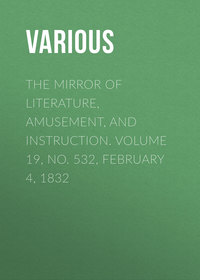The Mirror of Literature, Amusement, and Instruction. Volume 19, No. 532, February 4, 1832

Полная версия
Добавить В библиотекуАвторизуйтесь, чтобы добавить
Добавить отзывДобавить цитату
The Mirror of Literature, Amusement, and Instruction. Volume 19, No. 532, February 4, 1832
Авторизация